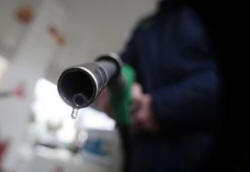|
 Oil
edges up toward $65, traders see more downside Oil
edges up toward $65, traders see more downside
 Send a link to a friend
Send a link to a friend
[December 11, 2014]
By Alex Lawler
LONDON (Reuters) - Oil edged higher on
Thursday towards $65 a barrel helped by a weaker U.S. dollar, although
prices remained close to a five-year low on signs that already ample
supply will be even more plentiful in 2015.
|
|
 Crude prices sank on Wednesday as OPEC forecast an increasing supply
surplus in 2015, U.S. crude inventories unexpectedly rose and OPEC's
most influential voice, Saudi Arabia's oil minister, shrugged off
the need for an output cut. Crude prices sank on Wednesday as OPEC forecast an increasing supply
surplus in 2015, U.S. crude inventories unexpectedly rose and OPEC's
most influential voice, Saudi Arabia's oil minister, shrugged off
the need for an output cut.
North Sea Brent crude <LCOc1> rose 63 cents to $64.87 by 6:12 a.m.
EST, up from Wednesday's low of $63.56 - the weakest since July
2009. U.S. crude <CLc1>, which also hit a five-year low on
Wednesday, rose 48 cents to $61.42.
"Brent could be seeing a bit of short-covering and it could have
quite a sharp rally after yesterday, but the market would still look
just as bearish," said Christopher Bellew, a senior oil broker at
Jefferies in London. "It would be unwise to say the market has
marked the bottom."

Brent has fallen more than 40 percent, or $50, from its 2014 high
reached in June. Commerzbank, which cut its 2015 Brent price
forecast to $73 a barrel from $82, also said it is too early to see
an end to the losing streak.
"We may see some technical bounces, but it is too soon to speak of a
sustainable price recovery," said Carsten Fritsch, analyst at the
bank.
A slightly weaker dollar <.DXY> gave sentiment a boost in commodity
markets. A weak dollar makes oil and other dollar-denominated
commodities cheaper for holders of other currencies.
OPEC said on Wednesday demand for its crude in 2015 would fall to
its lowest in more than a decade, indicating a large supply surplus
in 2015 without OPEC output cuts or a slowdown in the U.S. shale
boom.
[to top of second column] |

The prospect of any OPEC cut remained slim as Ali al-Naimi, the
Saudi oil minister, on Wednesday questioned the need for one,
sticking to his stance outlined at OPEC's meeting on Nov. 27 despite
a $13 drop in prices since then.
At the meeting, Saudi Arabia and its Gulf allies urged fellow OPEC
members to combat the growth in U.S. shale, which needs relatively
high prices to be economic and has been eroding OPEC's market share,
by resisting output curbs.
(Reporting by Alex Lawler and Adam Rose in Beijing; Editing by
Michael Urquhart)
[© 2014 Thomson Reuters. All rights
reserved.] Copyright 2014 Reuters. All rights reserved. This material may not be published,
broadcast, rewritten or redistributed.
 |